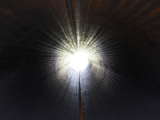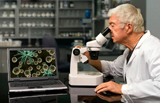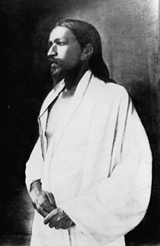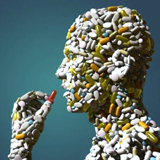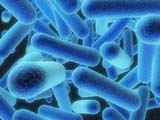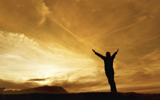The physician
Physician discover thyself
Introduction
Medical sciences, it is often remarked, have grown out of an instinct of self-preservation and have been evolving more out of fear of death rather than a quest for immortality. Nature translates itself into two allied yet apparently contradictory values — a movement in it that leads to growth and another movement that leads to decline and death. It is extremely important for us to recognise these two movements of Nature so as to collaborate with her working and assist her in the painful birth of a better and healthier life.
For this collaboration, man has to come out of narrow forms of thought, action and feeling, widen his scope to embrace all life and take it up as one issue. At present, we tend to look at ourselves as something apart from Nature which represents itself to our mind as something mechanical and unintelligent which we have to tame, control and alter. We forget that in all our workings and processes we do nothing but obey her secret intention in obscurity and ignorance. Unless this secret intention becomes obvious, we cannot place the right aim before us and continue to seek through blunderings and many stumbles. To know the goal of Nature is to know the secret of right living; to know the secret of right living is to know the secret of conscious evolution. The fall of Adam from Eden repeats itself in every age. The divorce of science from philosophy is precisely one such fall.
The Riddle of Nature (the problem)
To where does Nature lead us? Self-preservation, says the biologist! But if self-preservation for its own sake was the goal then the clod would fulfil it and an amoeba glorify it for an amoeba lives under the conditions of perpetual immortality! Preservation is one movement of Nature but not its last word. In fact destruction is also a means of Nature like preservation. Herein we get a hint if we look carefully. Neither preservation nor destruction but both as a means for evolution, is the key to Nature's notes that it plays upon our lives. But what is this evolutionary process that we speak of?
Darwin gave us his theories for the evolution of the form, its workings and processes. But he did not regard Nature as consciously working out evolution. On the contrary, evolution for Darwin was itself a means towards adaptation (self-preservation again)! Yet he remained mute on the question of ‘why this urge for preservation’, as also, of the evolution from a more adaptable amoeba to a less adaptable ape. We are surely missing something. Here we find the unique parallel drawn by Sri Aurobindo in the parable of the avatars of Indian tradition. He points out the progression of the avatars from fish to tortoise through a half-animal, half-human form to a series of more and more complex human consciousness. Two things stand out clearly in this parable. Firstly, the evolutionary process is not confined to a change of form but also to a change of consciousness that emerges. Secondly, each new grade of evolution appears after a distinct crisis in consciousness, a crisis which is both individual and collective. The existing order is loosened so that a new order can emerge and in the process of its loosening appear the dangers of a fall and the possibility of a rise. The fall, in turn, reflects itself in decline and destruction, emergence of new illnesses and new difficulties in every field. The rise reflects itself in the manifestation of new and higher values, novel discoveries that would radically lead us ahead and beyond our narrow frontiers, emergence of new and wider ideas and thought-forms and the evolution of a new social order. Obviously, whatever resists the evolutionary urge, gets destroyed and whatever is plastic to the change, undergoes the great and difficult transition. The rest remains as an evolutionary link that would find its stability again once the fire and fury of Nature for an onward march subsides.
We believe, as revealed to us by Sri Aurobindo and The Mother that mankind is presently passing through just such an evolutionary crisis. Nature has come out from its quiescent mood and is once again active in its grand labour and cosmic play. It is working towards the evolution of a new consciousness and is busy preparing a new form that can receive its mighty breath and contain it. Dinosaurs resisted. Man too resists. He is afraid of losing his humanness, limitations and imperfections. And he will continue to be afraid till he regards Nature as a mechanical, unconscious and an unintelligent something. He is afraid of losing his balance. He is afraid of disease and death. Hence hospitals multiply, drugs multiply, doctors multiply and as these grow, man feels yet smaller and yet more afraid. What was for him just a simple headache is now a disastrous ‘hypertension’ which may any time burst his arteries, blow out his brain, tear off his heart, make his kidneys fail and take away the light from his eyes. The patient today does not feel relieved when an illness is discovered. Very often he feels still more discouraged and depressed like a chick waiting to be skinned by the butcher. In this exclusive action towards self-preservation, we have to ask ourselves whether we are collaborating with Nature or merely closing our eyes, satisfied in our blindness and self-conceit.
How then to synthesise Nature’s aim and ours? Medical teaching teaches us merely the art of prolonging death and not of prolonging life. The humanities too, of which psychology is an important part, teach us to somehow adjust, so that we are ‘not harmed’ and our individual preservation is assured. This is termed as a healthy and mature ego! Most often physical culture also teaches us how to keep away diseases and hence remain ‘normal’ rather than strive to move from the normal to the supernormal. Impossible, we are told. Live in safe limits of normalcy for the supernormal is a freak, — a Hercules and a Ramamurthy are accidents; a sage is an anomaly of Nature less adapted to live in society. As evolution is merely a genetic mechanism, one can discover it in laboratories alone. All this we assert despite the fact that it is not words but the robust physique of a Ramamurthy that inspires an age to physical culture; and the calm and balance of a sage inspires millions to reach a greater zone of stability; and that the genetic engineers who do not even know fully how to manipulate a virus believe they can change man through a process of cloning.
The riddle of Nature (its solution)
The fundamental question remains, — what are we to do? A sick man comes to us. How do we manage? Habitually we rush for our emergency tools. Should we leave it all and passively trust Nature and its evolutionary urge? If we act, what should guide and move us so that we can collaborate and not hinder Nature?
The real issue then narrows itself down to two fundamental questions. Why health? Why cure? These very basic questions are often taken for granted or perhaps not even felt necessary. A busy medical practitioner satisfied with treating patients and making a fortune may even be uneasy raising these issues. Well, leave it to the philosophers and sociologists, he may say till the doom he is trying to oust from his patients strikes himself. To treat patients is to be responsible and to be responsible is to be conscious. Is the responsibility of a physician confined only to the organ and the pathology he is dealing with? What about the man behind the organ? Is it being responsible if we save an organ and lose the man or fill his psyche with the shadows of fear and death, take away his faith in himself and make him dependent upon chemicals and doctors? Has he not been rendered more helpless by the cure? We are naturally not referring to transient states of ill-health from which the patient comes around anyway with or without medical intervention. The question is: is it better to give a poor man food or to teach him how to earn? In some systems, the physicians are regarded as being as much in charge of the soul of the patient as of his body. This is so because the physician has a unique opportunity of meeting another of his kind in an hour of crisis and even death; moments when his inmost soul is just waiting for a touch to wake up. It is an important moment and if at this moment the physician could install in the patient a minimum of courage and faith, he would have practised the ABC of holistic medicine. Holism is not merely sealing the weak spots in the body and mind by a soothing balm but to go a step further, that is to ‘use’ the hour of crisis as a means and springboard for the patient to launch higher and deeper within himself.
The role of a physician
For this is precisely what Nature achieves through suffering and pain. Often it uses pain as a lever to accelerate our growth. And even though our waking mind abhors it, a deeper entity within takes it as a bitter medicine for a more radical cure. This does not mean that we should cherish the cult of suffering. On the contrary, suffering is an imperfection, a blot upon man's life which he should change into health. But there are sufferings and sufferings. Physical suffering seems to be there because the mind gives values to it. Take away that value and the suffering dissolves. Some drugs used for symptomatic relief do precisely that. The mind and the sensations are blunted so the suffering is annulled. But it is not so. There is a still deeper suffering, a suffering of the psyche that yearns for light, beauty, truth and bliss. It takes upon itself the imperfections, ignorance and pain of our outer Nature so as to annul and transmute them. To bring this psyche out by whatever means, using the illness as a pedestal or starting point is the chief task of a physician practising holistic medicine. The rest will follow. Yes, the very nature of the task demands, that to be a good physician one has to be a Yogi, one who is in tune with the truth of his being. Otherwise we will always fall short of the work that Nature has placed before us and will be busy doing patchworks or repeating rounds and rounds in the same circle believing that we are progressing. Will Nature’s secret intention let us rest with superficial cures and surface remedies? It can and will throw many challenges till one day we arrive at a deeper cure and the true significance of health and illness.
Our impatient mind may ask: will a person get rid of his symptoms and illness if the deepest psyche is called forth and the significance understood? We are naturally looking for a magic wand. The answer may not be as simple as that. For the first task of the inner self is to get rid of the fear of illness and death, which makes us grow in faith and strength. And till these tasks are achieved, it may not bring relief to the body. Yet a sense of well-being and a change, even a radical change of attitude, can follow. The very issue is shifted, the real nature of the crisis is understood. The inner disharmony leading to the outer movement of disease is revealed and by virtue of all this even outer cure becomes simpler and easier and what is more important, radical. Even death when seen as imminent is not confronted with anxiety and depression like a helpless rushing into some whirlpool where one sinks. Rather, the moment of death too is used gracefully and calmly as a means and a passage to a greater life. For with the stepping out of the true self in us, the over-occupation with our body is lost. One no longer struggles with an illness to merely ‘survive’ for one is aware that the soul is immortal. But one does not become passive to illness or invite it either. Instead, one works upon the disease and the disharmony so that the law of harmony and right balance may prevail. Not possessing the body, nor being possessed by it, it is seen as a sacred gift which one cares for, not out of attachment but because the body is needed for the fulfilment of Nature’s grand plan. For there is a secret intention in the movements of Nature, its seeming ‘chance’ and arbitrary rhythms. Illness is one means that Nature uses for us to rediscover ourselves as a whole and fulfilling the whole. Health too becomes a similar means for the same movement of rediscovery and for the same purpose. The former a short and hazardous route; the latter a longer but smoother way. Thus the physician’s role does not stop with a ‘cure’ but engages in an ongoing process from illness to cure and from cure to health and from health to wholeness and integration. Nothing short of this perfection can be the ideal of a holistic approach and this is a beginning, a first note in a huge symphony.
Physician discover thyself
How is one to do it? Naturally, one can’t help others if one has not attempted it in oneself. The adage redefined, ‘physician discover thyself’ applies well here. Unfortunately holistic medicine is not just a matter of gaining outer qualifications by way of degrees in all that pertains to the mind and body. Something else is needed which can neither taught in universities nor can be learned through medical textbooks. Being a mere ‘medico’ will not help. It may even sometimes be a disqualification if the informational knowledge received through our medical curriculum is not illumined by an inner sense. If we remain too obsessed with facts and figures, we may be fooled as the man who saw another become enlightened by kneeling down. He received nothing even after kneeling a hundred times so he concluded that there is no such thing as enlightenment. Yet, knowledge, even precise knowledge of outer details, is necessary and useful at some point. It is necessary to know how the human organism, specially the body and mind, work. Unless one knows how it works, how can one work upon it? To know these elements is, however, only one aspect. One also has to know the other element which is apart from the mind and body — the soul. But merely knowing it through the mind or reading about it is not enough, just as one cannot know the human body by reading anatomy through a textbook. One needs to know the soul by the soul. So our education needs to and must include this fundamental and most necessary element. It cannot be easy. No education is easy for it takes effort. But if we want to be true, we need to make an effort or else move endlessly in the same circle deluding our minds with the progress we have made. That it can be done is beyond doubt. Examples of great healers, past and present, from the times of Dhanvantri to Coué are there before us. Probably all ‘good’ doctors have it to some extent without being aware. Today it is rare, but rarity is not an impossibility. Those whose turn of nature urges them towards practising deeper truths of healing need to do it by putting in the necessary effort.
Conclusion
This then is a brief and broad outline of a doctor’s possible attitude towards illness: an attitude which will inspire the patient with a touch of true health and wholesome living. There is a consciousness that exceeds the doctor and the patient, there is a higher Force that is concretely effective, there is a merciful Grace that acts as a saviour. The doctor is only an instrument of the Divine and he should be more and more conscious of this. It may be well for him to remember that he can only give the treatment; ‘It is He who cures’.
Share with us (Comments, contributions, opinions)
When reproducing this feature, please credit NAMAH, and give the byline. Please send us cuttings.
